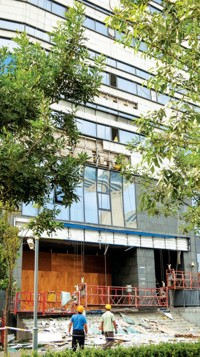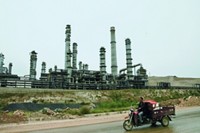Advertisement
Grab your lab coat. Let's get started
Welcome!
Welcome!
Create an account below to get 6 C&EN articles per month, receive newsletters and more - all free.
It seems this is your first time logging in online. Please enter the following information to continue.
As an ACS member you automatically get access to this site. All we need is few more details to create your reading experience.
Not you? Sign in with a different account.
Not you? Sign in with a different account.
ERROR 1
ERROR 1
ERROR 2
ERROR 2
ERROR 2
ERROR 2
ERROR 2
Password and Confirm password must match.
If you have an ACS member number, please enter it here so we can link this account to your membership. (optional)
ERROR 2
ACS values your privacy. By submitting your information, you are gaining access to C&EN and subscribing to our weekly newsletter. We use the information you provide to make your reading experience better, and we will never sell your data to third party members.
Policy
Protests Force Chemical Plant Closure In China
Environment: Authorities to shut independent aromatics producer
by Jean-François Tremblay
August 22, 2011
| A version of this story appeared in
Volume 89, Issue 34

Municipal authorities in Dalian, a city in northeast China, have ordered the closure of a recently built p-xylene plant after protests by local residents. The protests erupted a few days after waves from a tropical storm nearly swept through the facility, raising fears of an environmental disaster.
In an Aug. 17 statement, the municipal government of Dalian said work to permanently close the p-xylene plant has already begun. The statement quotes the city’s mayor as saying that the safety of local citizens is paramount.
The $1.5 billion plant belongs to Dalian-based Fujia Group. The company says the facility can produce up to 700,000 metric tons per year of p-xylene, a key raw material in polyester production. The plant, located about 20 miles from Dalian’s center, started operating in June 2009.
Earlier this month, about 1,000 firefighters and Chinese army troops frantically worked to rebuild a dike around the plant after waves from tropical storm Muifa breached the barrier, Chinese state media reported. This close call with an environmental mishap prompted thousands of Dalian residents to take to the streets and demand the immediate closure of the plant.
Authorities in China are keen to prevent civil disturbances, says David S. Jiang, president of Sinodata Consulting, a Beijing-based chemical market research firm. Jiang, who has no firsthand knowledge of the Fujia case, says he expects intense negotiations over financial compensation will now take place between Fujia and the Dalian government. “Dalian [officials] authorized this plant,” he says.
Chinese newspapers have reported that the Fujia plant will be relocated, although Jiang says such an operation would be extremely costly.
The Dalian protests are not without precedent in China. In 2007, middle-class protesters in the southern city of Xiamen prevented the construction of a p-xylene plant near the city center.





Join the conversation
Contact the reporter
Submit a Letter to the Editor for publication
Engage with us on Twitter